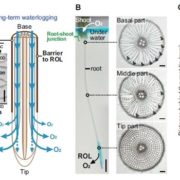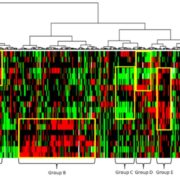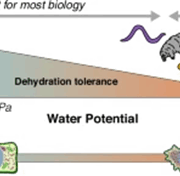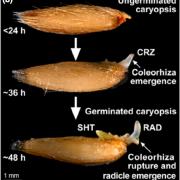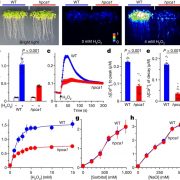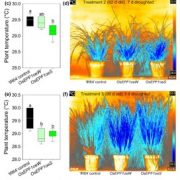Gravitropism with a pinch of salt: Changes in cell wall composition modulate root growth direction in saline conditions
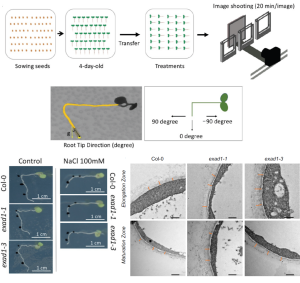 Soil salinization causes massive yield losses in agriculture, and its impact on plants goes beyond what our eyes can see. Roots are immediately affected by the direct exposure to a salt-(NaCl) rich substrate. Here, Zou et al. investigate the salt-induced altered root gravitropic responses in Arabidopsis thaliana, dissecting the role of cell wall modification in this process. The authors developed a phenotyping tool termed Salt-Induced Tilting Assay, which allowed them to reveal that altered salt-induced gravitropic responses are linked to sodium ions, not to osmotic stress. In search for the genetic elements behind this phenotype, a genome-wide association study of 345 Arabidopsis accessions underlined a potential role for EXTENSIN ARABINOSE DEFICIENT TRANSFERASE (ExAD). Extensins, key cell wall glycoproteins, are modified by ExAD through the addition of an arabinose residue (arabinosylation). Root direction angles of loss-of-function mutants exad1-1 and exad1-3 differed from those of Col-0 under saline conditions, as did arabinose levels, which were mildly lower due to extensins lacking ExAD-mediated arabinosylation. Mutants exad1-1 and exad1-3 had thicker, more porous, and less dense cell walls than Col-0, further illustrating the importance of arabinosylated extensins in preserving cell wall integrity under saline conditions. (Summary by John Vilasboa @vilasjohn) Plant Cell 10.1093/plcell/koae135
Soil salinization causes massive yield losses in agriculture, and its impact on plants goes beyond what our eyes can see. Roots are immediately affected by the direct exposure to a salt-(NaCl) rich substrate. Here, Zou et al. investigate the salt-induced altered root gravitropic responses in Arabidopsis thaliana, dissecting the role of cell wall modification in this process. The authors developed a phenotyping tool termed Salt-Induced Tilting Assay, which allowed them to reveal that altered salt-induced gravitropic responses are linked to sodium ions, not to osmotic stress. In search for the genetic elements behind this phenotype, a genome-wide association study of 345 Arabidopsis accessions underlined a potential role for EXTENSIN ARABINOSE DEFICIENT TRANSFERASE (ExAD). Extensins, key cell wall glycoproteins, are modified by ExAD through the addition of an arabinose residue (arabinosylation). Root direction angles of loss-of-function mutants exad1-1 and exad1-3 differed from those of Col-0 under saline conditions, as did arabinose levels, which were mildly lower due to extensins lacking ExAD-mediated arabinosylation. Mutants exad1-1 and exad1-3 had thicker, more porous, and less dense cell walls than Col-0, further illustrating the importance of arabinosylated extensins in preserving cell wall integrity under saline conditions. (Summary by John Vilasboa @vilasjohn) Plant Cell 10.1093/plcell/koae135


